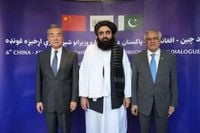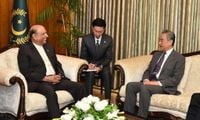In a series of high-level meetings held in August 2025, China, Pakistan, and Afghanistan have signaled a renewed commitment to deepening their trilateral partnership, with the China-Pakistan Economic Corridor (CPEC) at the heart of ambitious plans for regional connectivity and economic transformation. The diplomatic flurry included visits by Chinese Foreign Minister Wang Yi to Islamabad and Kabul, where he met with top leaders including Pakistani President Asif Ali Zardari, Prime Minister Shehbaz Sharif, Afghan Prime Minister Mullah Mohammed al-Ghani, and other senior officials. The agenda: fortifying economic ties, expanding infrastructure projects, and navigating the complex security and geopolitical landscape of South and Central Asia.
According to China Daily, President Zardari welcomed Wang Yi in Islamabad on August 21, expressing Pakistan's eagerness to advance the CPEC and the Gwadar Port projects to better serve the peoples of both countries. Zardari reaffirmed, "Regardless of the evolving global landscape, Pakistan completely trusts China and stands firmly with Beijing." He underscored the need for continued coordination on major international and regional issues to maintain peace, stability, and prosperity in the region. These sentiments were echoed in a readout from China's Foreign Ministry, which quoted Zardari as saying, "Pakistan is grateful for China's selfless support for its economic and social development and is ready to advance cooperation projects such as CPEC and Gwadar Port to deliver new progress and better benefit the peoples of both countries."
Wang Yi, for his part, assured Pakistani leaders that "China prioritizes its relationship with Pakistan in its neighborhood diplomacy," pledging unwavering support for Pakistan's sovereignty, territorial integrity, and national dignity. He emphasized that the China-Pakistan friendship is "unbreakable and as solid as rock," and that China would continue to stand by Pakistan amid a turbulent international environment. Wang called for enhancing cooperation in Gwadar Port, industrial parks, connectivity, and high-tech sectors to boost Pakistan's independent development capacities and resilience against external challenges. He also reaffirmed China's support for Pakistan's counter-terrorism efforts, stating, "China supports Pakistan in resolutely combating all forms of terrorist forces, so as to create a secure and favorable environment for national development and bilateral cooperation."
Prime Minister Shehbaz Sharif, meeting with Wang Yi the same day, looked ahead to attending the upcoming Shanghai Cooperation Organization (SCO) Summit in Tianjin and commemorative events marking the 80th anniversary of the victory in the Chinese People's War of Resistance Against Japanese Aggression. Sharif described the Pakistan-China relationship as a "unique, all-weather friendship," and expressed hopes for advancing "CPEC 2.0," a new phase of the flagship infrastructure initiative. He highlighted the importance of expanding cooperation in agriculture, mining, energy, aerospace, information technology, and infrastructure, declaring that Pakistan "attaches great importance to the safety of Chinese nationals in Pakistan and will make every effort to ensure the security of Chinese citizens and projects."
During his three-day visit, Wang Yi also met with Pakistani Chief of Army Staff Syed Asim Munir and co-chaired the sixth China-Pakistan Foreign Ministers' Strategic Dialogue with Deputy Prime Minister and Foreign Minister Mohammad Ishaq Dar. Munir emphasized the military's readiness to promote counterterrorism and security cooperation, vowing to "continue to make every effort to ensure the safety of Chinese personnel, projects, and institutions in Pakistan." The strategic dialogue reaffirmed both sides' commitment to deepening traditional friendship, enhancing strategic communication, and building a "closer China-Pakistan community of shared future in the new era," according to Global Times.
Meanwhile, the trilateral dimension of these efforts came into sharp focus in Kabul, where Wang Yi, Ishaq Dar, and Afghan Foreign Minister Amir Khan Muttaki agreed to strengthen cooperation and integrate Afghanistan more fully into the CPEC framework. As reported by News18, the existing CPEC stretches nearly 2,500 kilometers from Kashgar in China's Xinjiang region to the Arabian Sea port of Gwadar in Pakistan. Plans to extend the corridor into Afghanistan could add another 350 kilometers, with future links envisioned toward Iran. The most viable entry point for CPEC into Afghanistan is through the Wakhjir Pass, the only road link between Afghanistan and China, though alternative routes such as the Wakhan Corridor are also under consideration despite challenging terrain and security risks.
The trilateral talks in Kabul, as detailed by SpecialEurasia, went beyond economic cooperation to include pledges of enhanced counter-terrorism collaboration, increased trade, transit facilitation, and shared strategies for border management. China expressed its willingness to invest in Afghan mining, agriculture, and infrastructure projects under the Belt and Road Initiative (BRI), with Wang Yi reaffirming Beijing's support for Afghanistan's sovereignty and objecting to financial limitations imposed on Kabul. The agreements included China's intention to help patrol the Wakhan Corridor, a move aimed at stabilizing its western border and restricting activities of Uyghur separatist groups.
However, the road ahead is laden with challenges. For the Taliban government in Afghanistan, Chinese involvement is crucial for economic survival and gaining international legitimacy, but the regime's ability to guarantee security and effective governance remains in question. The Islamic State Wilayat Khorasan (ISKP) continues to launch high-profile attacks, threatening both Taliban authority and the safety of foreign investors. Pakistan, while playing a critical facilitating role, faces its own internal instability and economic vulnerabilities, complicating its ability to guarantee a stable corridor for Chinese projects.
India, meanwhile, has watched these developments with a wary eye. As News18 notes, any route from Gwadar to Kabul would inevitably pass through Gilgit-Baltistan and Pakistan-occupied Kashmir—a segment India considers a violation of its sovereignty. While Indian officials acknowledge that increased stability in Afghanistan could improve trade flows and complement India's investments in Iran's Chabahar Port, they remain deeply concerned about the security and geopolitical implications of an expanded CPEC.
The broader regional picture is equally complex. Russia and Iran, both with interests in Afghanistan's future, have adopted strategies aimed at balancing China's growing influence. Russia's pragmatic engagement with the Taliban and Iran's efforts to link Afghanistan to its own trade routes through Chabahar present alternative visions for regional connectivity. Meanwhile, ongoing instability or a major attack on Chinese assets could force Beijing to reconsider its current approach, highlighting the delicate equilibrium that underpins these ambitious projects.
Despite the obstacles, the recent flurry of diplomacy underscores a shared determination among China, Pakistan, and Afghanistan to pursue economic integration, security cooperation, and regional stability—however daunting the path may be. The success of these efforts will hinge on the ability of all parties to navigate persistent security threats, governance challenges, and the competing interests of regional powers.
For now, the vision of a "CPEC 2.0"—linking China, Pakistan, and Afghanistan in a web of trade, infrastructure, and shared prosperity—remains both a bold aspiration and a test of regional diplomacy and resilience.





